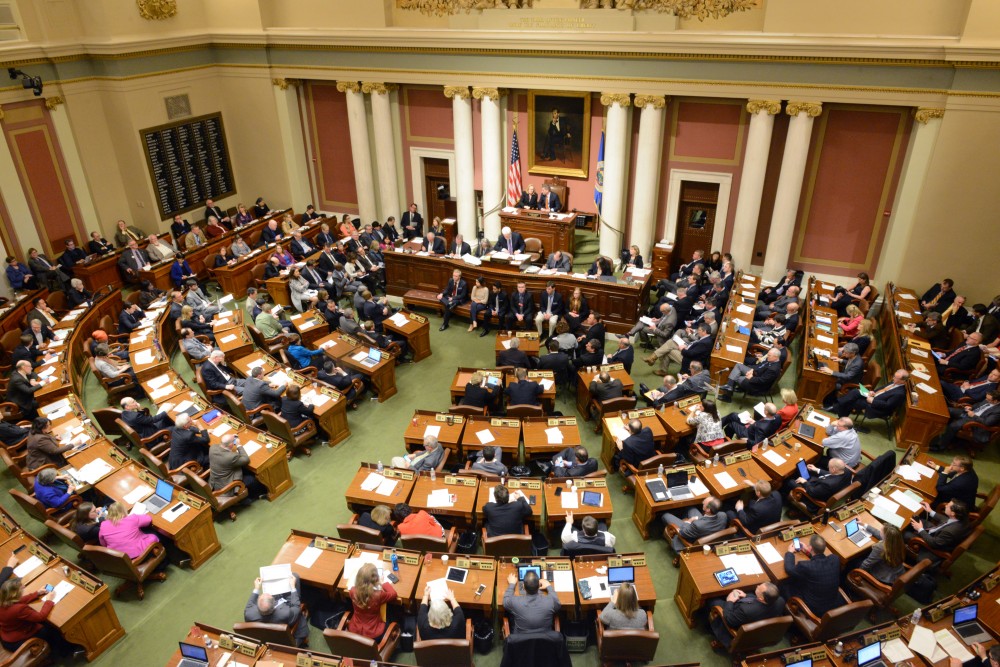A legislative proposal to make student service fees optional at the University of Minnesota could violate the school’s constitutional autonomy from the state.
If passed, the measure would request that the University make student service fees optional, but if it didn’t, the state would penalize it by withholding some state funding. University leaders, officials and political experts say the penalty could be a violation of the school’s independence from the state and trigger a legal battle.
The University’s constitutional autonomy gives the school the power to refuse enactment of certain policies requested by the Legislature.
“The Minnesota Legislature would not be respecting the constitutional autonomy of the University if it said, ‘Do what you want,’ and then put a gun to its head,” said Larry Jacobs, director of the Center for the Study of Politics and Governance at the University’s Humphrey School of Public Affairs.
He said the proposal, if enacted, may warrant a court battle if not vetoed by Gov. Mark Dayton, where he thinks the University would have a solid case.
The measure, which has been opposed by students, is meant to help drive down the cost of higher education, especially for students who can’t afford to or aren’t interested in participating in campus activities funded by the fees, according to the bill’s author, Rep. Drew Christensen, R-Savage.
Christensen, a recent University graduate, said he doesn’t think the bill violates the state constitution.
“The constitution doesn’t say anything as far as how much money the Legislature has to allocate to the University of Minnesota,” he said.
Dean Johnson, chair of the University’s Board of Regents, said he expects Dayton to veto the bill.
If the proposal passes, Regent Darrin Rosha and Johnson said clashing with the state over autonomy issues may not be worth the political costs.
“To challenge autonomy has to be used very judiciously and sparingly,” Johnson said. “You could win the battle but lose the war.”
The Legislature has a perception that the University is arrogant about its standing, said Stephen Kelley, a Humphrey School of Public Affairs researcher. Taking the state to court would likely inflate that perception, he said.
But if students or a governing body like the Minnesota Student Association joined a lawsuit, the appearance of the case could change, Kelley said.
In an emailed statement, the University’s Office of the General Counsel said the proposal raises constitutional concerns but otherwise declined to comment.
Student fees help fund a wide range of student groups, media centers and activities on campus, including Boynton Health, The Aurora Center, Student Legal Services and the Disc Golf Club, among others.
The fee, which has increased every year since at least 2006, was $432.18 this school year.
Whether the measure is included in a final higher education spending bill will be determined in the coming weeks as the House and Senate work out differences between their proposals in conference committee sessions before sending a finalized bill to the governor.
Students raise concerns
On Sunday, almost 60 student government leaders from all University campuses urged legislators to reject the student service fees provision in a letter to the Senate and House higher education committee chairs.
“This is not a policy students have asked for, as it would result in the diminishment of the quality of our educational experience and jeopardize critically needed student services,” the letter read.
Student leaders also said in the letter that the measure would create inequitable conditions where only students who can afford to pay the fee can participate in funded activities — resulting in limited programming that would make other schools more attractive.
“I’m quite worried,” said Minnesota Student Association President Abeer Syedah. “I think what concerns me the most is that this is a process that students have been very vigilant about … in some ways this takes some of [students’] autonomy away.”
Professional Student Government President Max Hall signed the letter and said legislators’ focus on student service fees was misplaced.
“I think there’s a broader conversations to have about the affordability of college,” Hall said.
Professional students have traditionally had concerns over the fees, he said, but eliminating mandatory fees entirely isn’t a solution.
Graduate students have always been concerned about fees, said Council of Graduate Students President Nicholas Goldsmith, adding that he opposes the provision.
“There are lots of things that it could have impacts on … it would decimate [things] that COGS care about, like the child care center and COGS itself,” he said.
Danita Brown Young, vice provost for student affairs and dean of students, said her office has not been planning for situations where the bill passes.
“We are definitely aware of what the potential impact could be,” she said. “But we would have to come together as an institution to see what those plans would be, but right now we have not.”
















